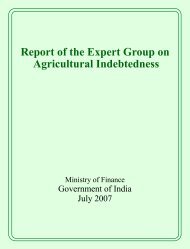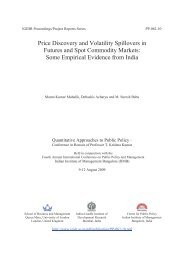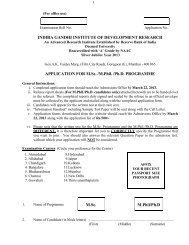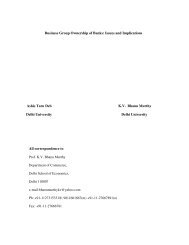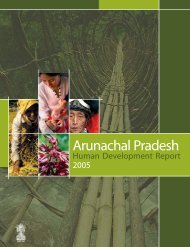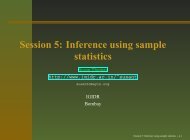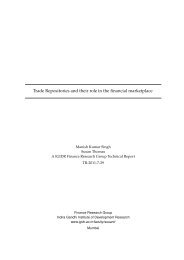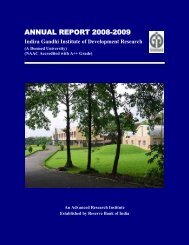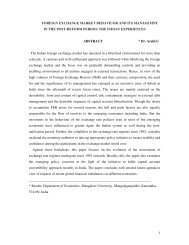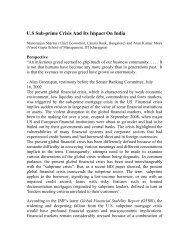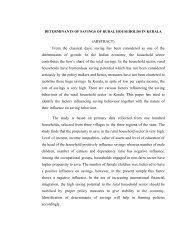National Human Development Report: 2001 - Indira Gandhi Institute ...
National Human Development Report: 2001 - Indira Gandhi Institute ...
National Human Development Report: 2001 - Indira Gandhi Institute ...
- No tags were found...
You also want an ePaper? Increase the reach of your titles
YUMPU automatically turns print PDFs into web optimized ePapers that Google loves.
NATIONAL HUMAN DEVELOPMENT REPORT <strong>2001</strong> GOVERNANCE FOR HUMAN DEVELOPMENT 121delivery systems to utilise optimally the available resources. Consider thecase of rural development programmes in the Central Government.Excessive compartmentalisation of the executive into Ministries/Departments has ensured that such programmes are not only spread over ahost of Ministries encouraging a narrow sectoral approach to conceiving,formulating and implementing the schemes, but also prevents mutualsynergies that are inherent in most social sector programmes to benefit theplan initiatives. The duplication of delivery structures and the proceduralhurdles invariably curtail the flow of assistance to the targeted beneficiaries.The Mid-Term Appraisal of the Ninth Plan, for instance, points out that anamount of at least Rs. 400 billion per annum flows for rural development byway of Central and State schemes in sectors like health and family welfare;social justice and empowerment; watershed development throughagriculture; tribal development; subsidies on food and kerosene; and throughschemes of rural development. This is in addition to public investment ininfrastructure like roads and power which also directly benefits the rural poor.This is directed at about 50 million poor families who, on an average, arethus being allocated roughly Rs.8,000 per annum. This amount is sufficientto buy nearly 3 kg. of foodgrain per day at the average rate of Rs.7.50 per kg.potentially permitting them to overcome significantly their state ofdeprivation. The reason that this money is not being directly transferred tothe targeted poor, and is being spent on state run development schemes, restson the assumption that such initiatives, are likely to build capacities, raiseincome levels and have multiple spin-off effects in the long run. The factthat benefits are not percolating at the desired pace is a reflection on thegovernance of these schemes. There is significant scope for improvingadministrative and delivery mechanism by involving people and theparticipatory bodies at the local level. Similarly, much more can be achievedby releasing private initiatives and the latent entrepreneurial energies of theindividuals by addressing the procedural and legal hurdles that come in theway of local level economic activities. States, where institutional changeshave been made to decentralise delivery mechanism, have started showingbetter results in building individual and community capacities for tacklingthe incidence of poverty and deprivation.The macro-economic management of the economy at the Centre andin the States, in general, and that of public expenditure, in particular, alsohighlights the deficiencies in governance practices resulting from the inertiain the relevant institutions and their practices to keep pace with thechanging contexts. Constitutionally, the federal structure of Indian polityplaces greater responsibilities on the Central Government to raise andallocate the resources needed for undertaking, among others, regionallybalanced development in the country. These resources are allocated amongthe States on the recommendations of the Finance Commission — astatutory body for assessing and recommending the flow of resources to meetthe non-plan or the revenue requirements of the States — and the PlanningCommission, which has been assigned the responsibility of preparing themedium-term national plans in consultation with the Central and StateGovernments and allocate resources to undertake planned activities. In thepast, with the elected governments lasting their full terms, there has been anoverlap in the five-year plans, the tenure of the Government and the term ofthe Finance Commission. With the changing political environment —premature dissolution of lower house of the Parliament, coalition



